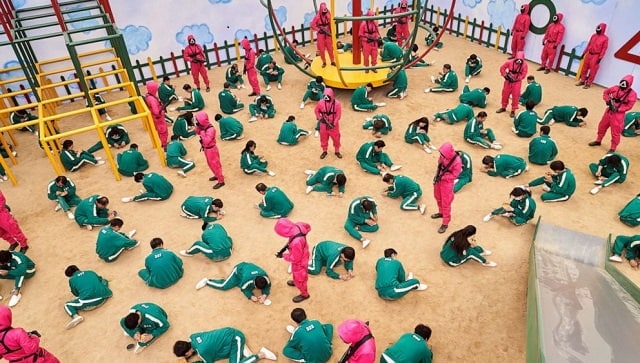While accepting one of the many, many awards the film Parasite won, South Korean director Bong Joon-ho asked viewers across the world to overcome the ‘one-inch-tall barrier of subtitles’. Two years later, Squid Game , the ultraviolent South Korean show is the ‘it’ series around the world. In the three weeks since its low-key worldwide release, the gritty, grim, and gruesome drama has become Netflix’s ‘biggest show ever’ with over a 100 million households having consumed it so far.
The
nine-part Netflix Original
revolves around a group of financially distressed people from all walks of life who sign up for a blood n’ gore race with an unimaginably large cash pay-out. The twist? Lose the games and you die. Written and directed by Hwang Dong-hyuk, the show examines despair, greed, and a yawning gap between the haves and the have-nots. This is juxtaposed against a series of simple childhood games like Tug-of-War, Red Light – Green Light, carried out in pastel-coloured playrooms. This premise, coupled with some really interesting characters, results in a perfect storm of revulsion and fascination that is impossible to look away from. Not only does the show have a 100 percent approval rating on the review aggregator Rotten Tomatoes, it has also
inspired online merchandise
, spawned TikTok challenges, and memes. Squid Game has well and truly become a part of the cultural zeitgeist. The journey of the show towards global domination is very similar to Parasite, the first non-English film that made history by winning four Oscars, including Best Picture. This is a reminder that audiences have an appetite for compelling storytelling and stunning visuals regardless of language or even familiarity. The comparisons to Joon-ho’s masterpiece are not just limited to the global success. At their core, both Parasite and Squid Game are a biting
critique of inequality.
[caption id=“attachment_10051351” align=“alignnone” width=“640”] A scene from “Honeycomb Cookie” Game in “Squid Game.” Oct, 2021. The irony of grown-up adults risking their lives to win money to repay their debts by playing kids’ games has attracted global viewers | Netflix[/caption] The title Parasite refers to the Kim family, who live in sewage-flooded squalor and start leeching off the wealthy Park family. The Kims worry about money while the Parks are more concerned about unpleasant smells emanating from poor people. The Parks live in an ultra-modern home with giant panes that give them sweeping views of their meticulously mowed garden and manicured hedges while the Kims scamper down city steps into a tiny home that looks out into a street that also is a urinal for drunks. And the Kims celebrate with cheap pizza while a casual meal in the Park household involves premium cuts of beef. Parasite is a more personal story about a working-class family that has no hope of a better life, and are okay living off the literal scraps cast off by the wealthy, while the series explores a society so callous that a group of people are willing to gamble their lives for money. Both are dark parables about a society built on the foundations of capitalism but overpowered by its most extreme form. And this is what explains both their global success. Around the world, the rich are getting richer and the middle class is slowly but steadily slipping into debt and poverty.
A scene from “Honeycomb Cookie” Game in “Squid Game.” Oct, 2021. The irony of grown-up adults risking their lives to win money to repay their debts by playing kids’ games has attracted global viewers | Netflix[/caption] The title Parasite refers to the Kim family, who live in sewage-flooded squalor and start leeching off the wealthy Park family. The Kims worry about money while the Parks are more concerned about unpleasant smells emanating from poor people. The Parks live in an ultra-modern home with giant panes that give them sweeping views of their meticulously mowed garden and manicured hedges while the Kims scamper down city steps into a tiny home that looks out into a street that also is a urinal for drunks. And the Kims celebrate with cheap pizza while a casual meal in the Park household involves premium cuts of beef. Parasite is a more personal story about a working-class family that has no hope of a better life, and are okay living off the literal scraps cast off by the wealthy, while the series explores a society so callous that a group of people are willing to gamble their lives for money. Both are dark parables about a society built on the foundations of capitalism but overpowered by its most extreme form. And this is what explains both their global success. Around the world, the rich are getting richer and the middle class is slowly but steadily slipping into debt and poverty.
Money and power run the world we live in today, and people – like the characters in Parasite and Squid Game – are being driven to a point where they will do anything in their capacity to gain and maintain financial security.
Dong-hyuk, a well-known South Korean director of films like Silenced and The Fortress, developed Squid Game in 2008 as a film but abandoned it because he thought it was ’too grotesque and complex.’ He has confessed to have been inspired by manga and manhwa (Japanese and Korean comics respectively) and the Japanese horror-satire Battle Royale while ideating the nine-episode series. He paired the idea with the ‘golden spoon versus dirt spoon phenomenon,’ a theme that generations of Korean film directors have explored. Before he made Parasite, Joon-ho’s films like the monster/family saga The Host and post-apocalyptic action thriller Snowpiercer reflected global anxieties about capitalism in an increasingly unequal world. [caption id=“attachment_9216701” align=“alignnone” width=“640”] Still from Parasite[/caption] While both Parasite and Squid Game are seen as a part of Hallyu or
the ‘Korean Wave
,’ where the world is obsessed with all things South Korean –
K-Pop
, K-drama, K-Beauty, and K-Film, the film and the show give the world a peak into a much darker aspect of the country. At the time Parasite released, it took some sheen off the glamorous image of South Korea, and brought into focus the brutal paradox at the heart of its social structure. Days after the dream run of the film at the Oscars, the South Korean government announced a plan to support households living in semi-basement apartments like the Kims. More recently, politicians, in a lead up to the presidential elections in South Korea next March, have started referencing Squid Game since its mid-September release. From the time that Parasite made a splash in the French Riviera winning the Palme d’or at the Cannes Film Festival to its Oscar run, there were enough Americans scoffing at the idea of reading subtitles. That Squid Game has been No 1 in over 90 countries, including the US, is a huge win for non-English filmmakers. It means that audiences in overwhelming numbers would have watched this violent study of greed and classism more than shows like Bridgerton,
The Queen’s Gambit
,
Tiger King,
Emily in Paris
, and Money Heist
. Squid Game is streaming on Netflix while Parasite is streaming on Amazon Prime Video. Author of Parveen Babi: A Life, Karishma Upadhyay has been writing about movies and movie stars for almost two decades. On Twitter, she goes by @karishmau.
Still from Parasite[/caption] While both Parasite and Squid Game are seen as a part of Hallyu or
the ‘Korean Wave
,’ where the world is obsessed with all things South Korean –
K-Pop
, K-drama, K-Beauty, and K-Film, the film and the show give the world a peak into a much darker aspect of the country. At the time Parasite released, it took some sheen off the glamorous image of South Korea, and brought into focus the brutal paradox at the heart of its social structure. Days after the dream run of the film at the Oscars, the South Korean government announced a plan to support households living in semi-basement apartments like the Kims. More recently, politicians, in a lead up to the presidential elections in South Korea next March, have started referencing Squid Game since its mid-September release. From the time that Parasite made a splash in the French Riviera winning the Palme d’or at the Cannes Film Festival to its Oscar run, there were enough Americans scoffing at the idea of reading subtitles. That Squid Game has been No 1 in over 90 countries, including the US, is a huge win for non-English filmmakers. It means that audiences in overwhelming numbers would have watched this violent study of greed and classism more than shows like Bridgerton,
The Queen’s Gambit
,
Tiger King,
Emily in Paris
, and Money Heist
. Squid Game is streaming on Netflix while Parasite is streaming on Amazon Prime Video. Author of Parveen Babi: A Life, Karishma Upadhyay has been writing about movies and movie stars for almost two decades. On Twitter, she goes by @karishmau.
)